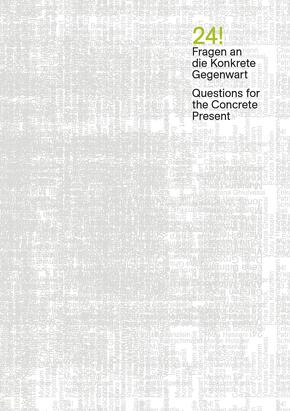24! / Fragen an die Konkrete Gegenwart / Questions for the Concrete Present
| Verlag | Deutscher Kunstverlag |
| Auflage | 2024 |
| Seiten | 176 |
| Format | 17,0 x 1,4 x 24,3 cm |
| Großformatiges Paperback. Klappenbroschur | |
| Gewicht | 589 g |
| ISBN-10 | 3422802223 |
| ISBN-13 | 9783422802223 |
| Bestell-Nr | 42280222A |
Deutsch-englische Ausgabe
So präzise sich die Konkrete Kunst auch gibt, über die genaue Geburtsstunde ihrer Namensgebung lässt sich dagegen nur Ungefähres berichten. Mit seinem gleichnamigen Manifest führte Theo van Doesburg den Begriff 1930 zwar offiziell in die Kunsttheorie ein. Aber bereits 1924 soll ihn der niederländische Künstler, Architekt und Theoretiker erstmals formuliert und für eigene Werke verwendet haben. 100 Jahre später liefert dieses Jubiläum trotz aller Ungewissheit die passende Gelegenheit, die Generation heute junger, dieser Richtung stilistisch nahestehender Künstler/-innen eingehend nach ihrem Verhältnis zur Konkreten Kunst zu befragen. Welchen Einfluss haben die Anfänge der Kunstrichtung auf ihr eigenes bildnerisches Schaffen? Sind ihre Prinzipien auch heute noch aktuell? Und gilt Gleiches auch für ihren Namen? Ihre Statements bilden - neben einem kurzen historischen Überblick über die Anfänge der Konkreten Kunst - ein zentrales Element der Publikatio n.
100 Jahre Konkrete Kunst - Aktualität und Zukunft einer Kunstrichtung Künstler/-innen: Banz & Bowinkel, Carsten Beck, Anna-Maria Bogner, Nina Brauhauser, Martim Brion, Sebastian Dannenberg, Lena Ditlmann, Fabian Gatermann, Charlotte Giacobbi, Dave Grossmann, Vladiana Ghiulvessi, Toulu Hassani, Erika Hock, Marile Holzer, Silvia Inselvini, Patrizia Kränzlein, Schirin Kretschmann, Sali Muller, Catalin Pislaru, Fiene Scharp, Marco Stanke, Virginia Toma, Amalia Valdés, Jonas Weichsel Ausstellungen: Museum fur Konkrete Kunst Ingolstadt, 23.3.-22.9.2024; Museum im Kulturspeicher Wurzburg, 24.3.-22.9.2024
Blick ins Buch
German-english edition
Although Concrete Art comes across as very precise, it is only possible to say approximately when the name was born. In his manifesto of the same name, Theo van Doesburg officially introduced the term to art theory in 1930. But the Dutch artist, architect and theorist is said to have conceived it for the first time and applied it to his own works as early as 1924. 100 years later, despite all the uncertainty, this anniversary is a fitting opportunity to question today's generation of young artists with a stylistic affinity to the movement in detail about their relationship to Concrete Art. What influence have the beginnings of the art movement had on their own visual work? Are its principles still relevant today? And does the same apply to the name? Their statements - in addition to a brief historical overview of the origins of Concrete Art - are a central element of this publication.
100 years of Concrete Art - the present and future of an art movement Artists: Banz & Bowinkel, Carsten Beck, Anna-Maria Bogner, Nina Brauhauser, Martim Brion, Sebastian Dannenberg, Lena Ditlmann, Fabian Gatermann, Charlotte Giacobbi, Dave Grossmann, Vladiana Ghiulvessi, Toulu Hassani, Erika Hock, Marile Holzer, Silvia Inselvini, Patrizia Kränzlein, Schirin Kretschmann, Sali Muller, Catalin Pislaru, Fiene Scharp, Marco Stanke, Virginia Toma, Amalia Valdés, Jonas Weichsel Exhibitions: Museum fur Konkrete Kunst Ingolstadt, 23.3.-22.9.2024; Museum im Kulturspeicher Wurzburg, 24.3.-22.9.2024
Look Inside




















